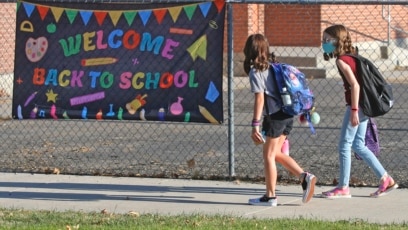Across America, many public spaces are taking on an unlikely new responsibility this fall. They are welcoming children for distance learning while their parents go to work. Among such places are martial arts centers, dance schools, community centers and libraries.
With many schools still closed because of the coronavirus crisis, a lot of Americans are looking for places to provide supervised learning to children during the workday.
These places can help families that had difficulties with distance learning last spring. But organizers admit they are a poor replacement for schools with professional educators.
One example is in Broward County, Florida. When schools in the area announced plans to begin the new year with distance learning, dance studio owner Katie Goughan thought immediately about the difficulties facing working parents.
Her dance school, Dance Explosion Company in Hollywood, Florida, hired a temporary teacher. The teacher is there from 7 a.m. to 3 p.m. to make sure the students are studying. The dance school program costs $150 a week, or $35 a day.
“I thought to myself, ‘What would my parents have done with me?’” Goughan said. She added that she wanted to reduce “any stress that parents might be under right now trying to find somewhere for their kids to do their schoolwork.”
The dance school currently accepts 10 children during the day. All of them wear face coverings. Goughan says temperature checks are carried out and the children are urged to use hand sanitizer often.
Some experts note, however, that inviting students to gather in new spaces could increase the risk of caregivers catching the virus.
Dr. Aileen Marty is a disease specialist at Florida International University. She told The Associated Press that the only way groups outside of school will work is ”if you know everybody in that group, a very small group, and everyone is tested and tested negative.”
Jennifer Quisenberry, a 37-year-old nurse practitioner, is sending her 6-year-old daughter, Audra, to a “distance learning camp.” The program is held at Premier Martial Arts in Wildwood, Missouri.
Her daughter’s school district is beginning the year online. But Jennifer and her husband have to go to work.
“We can’t not come to work,” Quisenberry said. “My partners said I could bring Audra to work. But a hospital is not an ideal setting for a 6-year-old in the middle of a pandemic.”
While many wealthy American parents are turning to so-called “learning pods” and private teachers, nonprofits and local governments are trying to help low income families.
In Philadelphia, Pennsylvania, city officials announced recently that they would open 31 drop-off sites at community centers, libraries, and other places. The program will pay attention to families with the greatest need, including those who cannot afford childcare and those who do not have internet at home.
San Francisco is creating “community learning hubs” at 40 places across the city to help with distance learning for children who are poor, homeless, in foster care or learning English as a second language.
In Kansas City, Missouri, the parks department is working with nonprofit groups to offer distance learning to hundreds of students. For students from Kansas City Public Schools, the city’s poorest district, the program is free.
“It is tough for parents with school-aged children who are too old to go to preschool, and hiring a babysitter or nanny is not an option for their finances,” said Roosevelt Lyons, deputy director of operations for the parks department.
Carrie Hutchcraft is the chief administrator with the Magic House, a children’s museum in Kirkwood, Missouri. The museum offers a distance learning program for about 80 students each day. Hutchcraft’s own 9- and 7-year-olds will be among them.
“I feel like they already have got behind in learning new things last year, but we can’t do that again,” she said.
I'm John Russell

Words in This Story
martial – n. of or relating to combat, fighting, war or soldiers
stress - n. a state of mental tension and worry caused by problems in your life, work, etc.
sanitizer - n. a chemical substance designed to kill germs
negative - adj. not showing the presence of a particular germ, condition, or substance
pandemic - n. medical : an occurrence in which a disease spreads very quickly and affects a large number of people over a wide area or throughout the world
hub – n. the central and most active part or place
foster -- adj. always used before a noun used to describe a situation in which for a period of time a child lives with and is cared for by people who are not the child's parents
museum n. a building in which interesting and valuable things (such as paintings and sculptures or scientific or historical objects) are collected and shown to the public